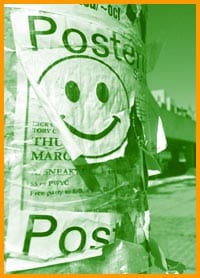A lot of queer groups who use postering to promote themselves could be dead in the water if a new proposed by-law is passed that will prohibit them from plastering the city with them.
The City Of Toronto’s Planning and transportation committee voted earlier this month to bring the proposal to City Council on Wed, Apr 17. The by-law will fine groups $60 per poster unless they use designated utility poles with plastic collars that hold the ads. The committee originally said 2,000 poles will be available, but that number was later increased to 4,000.
Community activist Reg Hartt sees the by-law as a cash grab.
“These fines will bankrupt the entire alternate culture and regular culture scene in this city,” says Hartt, who uses postering to promote his movie program. he points out that postering was very important for rallying the gay and lesbian community after the police raided the bathhouses in 1981.
Hartt estimates that the average band, for example, puts up 500 posters for a one-night show.
“Four bands doing a show one night in a club would see 2,000 posters on the street. Multiply this by seven days a week, 30 days a month, and we have a nightmare.”
Grant Orchard, with Concerned About Free Trade, says the ones ruining the poster brigade are the commercial companies that lambaste the city with the ads, as well as those organizations who are not familiar with the city’s current by-law.
“Our public space is dwindling and we’re fighting to keep it,” says Orchard. “Because there’s a few that spoil it, they can’t ban it for all of us.”
Right now, the city allows postering on all utility poles and public construction barriers, but it’s illegal to poster on private property, mailboxes, parking meters or private lamp stands. The city reserves the right to take them down as they please.
Ward 15 councillor Howard Moscoe doesn’t agree with the proposed by-law but believes something has to be done about the blight of posters in the city.
“People are slapping these things up all over the place. The city recently spent millions revamping Spadina Ave and everything is covered in posters,” says Moscoe.
But he says the by-law will be almost impossible to regulate and enforce; the committee suggests all posters contain a name and phone number. Moscoe says this is an infringement of privacy.
This isn’t the first time the city has tried to come down on postering. In 1988 it had a by-law that prohibited postering on public facilities. Citizens Concerned About Free Trade was charged under this law after it promoted an information night. In 1990 the court ruled in favour of the organization. The city appealed, but the Supreme Court Of Canada said the law infringed on the freedom of expression. The current by-law has been in place since 1997.

 Why you can trust Xtra
Why you can trust Xtra


